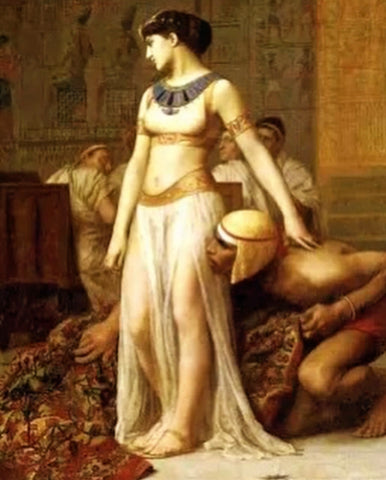Cleopatra’s Beauty Routine

Cleopatra, the ancient Egyptian queen, is renowned for her timeless beauty and captivating charm. Throughout history, her name has become synonymous with alluring femininity and seductive allure. Her secret? A carefully crafted beauty routine that remains legendary even in our modern age.
Cleopatra understood the power of self-care and believed that beauty is not just about superficial appearances but also a means of nurturing the soul. She dedicated significant time and effort to maintain her youthful looks, employing natural ingredients and ancient secrets passed down through generations.
Milk and Honey Baths
One of the most famous aspects of Cleopatra’s beauty routine was her indulgence in luxurious milk and honey baths. She believed that these concoctions helped keep her skin supple and glowing.
Milk baths were a common practice in ancient Egypt, known for their hydrating and moisturizing properties. Milk contains lactic acid, which acts as a natural exfoliant, leaving the skin smoother and more radiant.
Honey, on the other hand, is renowned for its antibacterial properties and ability to lock in moisture. Cleopatra often added essential oils and fragrances to her baths, making them a sensory delight.

Natural Ingredients: Aloe Vera and Olive Oil
Cleopatra, known for her knowledge of herbal medicine, utilized the power of natural ingredients to maintain her beauty. Aloe vera, a staple in her beauty routine, was prized for its soothing, moisturizing, and anti-aging properties.
It was said that she used the gel from the aloe plant to treat blemishes and nourish her skin. Olive oil, another key component, was used to cleanse, moisturize, and protect the skin from the harsh Egyptian climate.

Kohl: The Iconic Eye Makeup
Cleopatra’s allure was undoubtedly enhanced by her mesmerizing eye makeup. Elaborate and dark, her distinctive eye makeup was created using kohl, a black pigment made from powdered minerals.
Kohl not only highlighted her eyes but also protected them from the glaring sun. It is believed that the lead in kohl had antimicrobial properties that prevented eye infections.

Crimson Lips
Cleopatra painted her lips with crushed carmine beetles that gave her lips a deep tint. Her legendary deep red lips became one of her signature features. These insects have been used for centuries as a natural dye source due to their vivid red color.
The process of extracting the dye involves crushing the dried female cochineal insects, which then produces a crimson dye called carmine.

Gemstone Eyeshadow
It is said that she would meticulously craft her own eyeshadows using a variety of ingredients, including crushed gemstones and pigments. These precious gemstones, such as emeralds, lapis lazuli, and malachite, were ground into fine powders to create vibrant shades for her eyes.
The colors Cleopatra opted for ranged from deep greens, blues, and purples to shimmering golds and silvers.

Skincare from the Nile: Mud Masks and Salt Scrubs
The river Nile played a crucial role in Cleopatra’s beauty routine. The silt-rich mud from the riverbed was known for its rejuvenating properties and anti-aging effects. Cleopatra would indulge in mud masks to detoxify her skin and maintain its youthful appearance.
Additionally, she would exfoliate with salt scrubs made from the salts found along the Nile's banks, leaving her skin smooth and luminous.

Cleopatra's beauty routine was not solely focused on physical appearances. She understood the power of inner beauty and the importance of relaxation and self-indulgence. She would often indulge in massages and aromatherapy, using essential oils like lavender and jasmine to calm her mind and soothe her senses. These rituals helped her achieve an inner radiance that further enhanced her external beauty.


Leave a comment